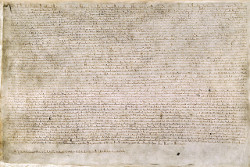 This year marks a monumental milestone in the political development of the United Kingdom. A document which was first drawn up to appease an unruly bunch of rebel barons and a very unpopular monarch marks its 800th birthday. Eight centuries after the Archbishop of Canterbury drafted the Magna Carta, we still use it as the basis for the unwritten constitution of the United Kingdom.
This year marks a monumental milestone in the political development of the United Kingdom. A document which was first drawn up to appease an unruly bunch of rebel barons and a very unpopular monarch marks its 800th birthday. Eight centuries after the Archbishop of Canterbury drafted the Magna Carta, we still use it as the basis for the unwritten constitution of the United Kingdom.
The fact that the legacy of the Magna Carta has survived so long is particularly remarkable seeing as its initial aim to create peace in Britain between the barons and the King was a failure. A civil war broke out once King John convinced the Pope to declare the document null and void. This civil war was brought to an end not by the mutual honouring of the agreement, but by King John’s death from a long illness a year later. It was King John’s son, Henry III, and his advisors who drew up a new, revised version of the Magna Carta and put it into effect.
Despite all of the controversy and unrest which it caused at the time, the general ideas of honouring freedom and justice have survived through the ages and form a large part of the ideals on which modern British society has been shaped and moulded. And it’s not just us in the United Kingdom who have benefitted from the signing of the Magna Carta. The most influential international politicians of the 20th century have honoured its greatness, with President Franklin D. Roosevelt, in his 1941 Inauguration Address, deeming it a precursor to democracy. In fact, it has served as the foundation for democracy and justice in over 100 countries around the world. There are very few documents which can make the same claim.
As well as promoting justice, freedom and democracy, the Magna Carta was the first real legal recognition of basic human rights within society. Much of the Magna Carta lays down the powers that the Crown had over barons according to the feudal system. This is, of course, no longer relevant in 21st-century Britain, but many of the details which did not seem that important at the time have come to be seen as basic rights of all British citizens today. The Magna Carta was the first document to give defendants the right to be tried by ‘knowledgeable’ persons. This right was not written into US law until 1974: that all defendants should have the right to trials overseen by fully qualified judges.
The Magna Carta’s importance in the protection of people’s rights was further reinforced when it was called upon to draw up the United Nations Declaration of Human Rights which was finalised in 1948. As Eleanor Roosevelt addressed the General Assembly before officially submitting this new document, she said, “This declaration may well become the international Magna Carta for all men everywhere.”
Whilst the Magna Carta has greatly influenced the fundamental ideas around which modern British society operates, only a few of its original clauses actually remain in the statute books in England and Wales. The first article refers to the right of British citizens and members of the Church of England to be protected by the document forever. It also bans royal interference in the selection of religious leaders. The 13th clause protects London’s ‘ancient liberties’. The 39th clause prevents any people who are owed money from seizing the property of a debtor if that debtor has the means to repay the debt. The 29th clause is the source of arguably the most famous quote from the Magna Carta: ‘we will not deny or defer to any man either Justice or Right’. This quote essentially sums up the relevance that the Magna Carta still has in the world today, protecting the rights of individuals in society.

